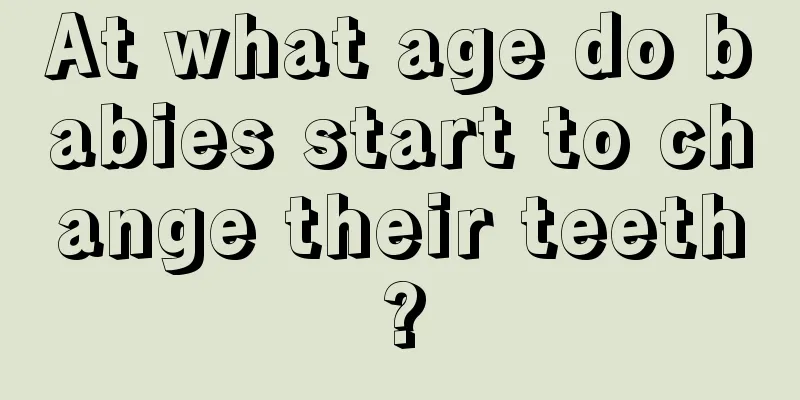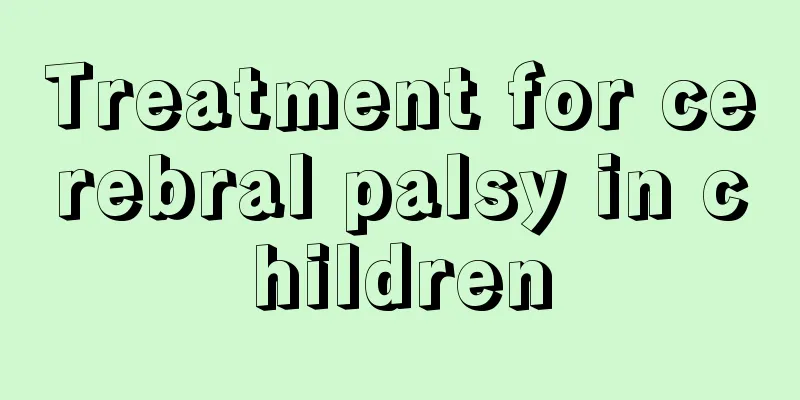At what age do babies start to change their teeth?

|
Tooth replacement is an inevitable process in the baby's growth and development, but at what age does the baby start to replace teeth? This is a question that many young parents often do not understand. Teething is very important for babies. Our parents should always pay attention to it at this time, because if the baby has bad habits, it will cause uneven or unsuccessful teething, so we parents must pay attention to this aspect. Babies are the apple of their parents' eyes. Parents give their babies the best so that they can grow up healthily. However, there are many things in the baby's growth process that we cannot predict, so many times due to our negligence or lack of understanding, the baby's body is harmed, which is something that all parents do not want to see. So, let’s talk about at what age babies start to change their teeth. Under normal circumstances, children begin to change their teeth at around 6 years old. The deciduous teeth begin to fall out physiologically, and the permanent teeth that replace the deciduous teeth erupt one after another. By the age of 12-13, all the deciduous teeth are replaced by permanent teeth. This is the period when children change their teeth. The order of children's tooth replacement is: the first permanent molar, also called the sixth-year molar, grows just behind the last deciduous molar at around 6 years old; slightly earlier or at the same time as the eruption of the lower central incisor, the deciduous lower central incisor falls out at around 6 years old, and the permanent lower central incisor grows out; at the age of 78, the deciduous upper central incisor falls out, and the permanent upper central incisor grows out, the deciduous lower lateral incisors fall out, and the permanent lower lateral incisors grow out; at the age of 89, the deciduous upper lateral incisors fall out, and the permanent upper lateral incisors grow out; at the age of 9-12, the first and second deciduous molars fall out, and the first and second bicuspids grow out; at the age of 10-12, the deciduous canines fall out, and the permanent canines grow out. The entire period of tooth replacement is an important period for children to protect their teeth. First of all, the first permanent molar to erupt, that is, the sixth-year molar, has the function of positioning and determining the height of the child's maxillofacial growth. It also affects the eruption and arrangement of other teeth. Protecting it well can benefit you throughout your life. Secondly, during the period of tooth replacement, we should pay attention to correcting children’s various bad habits. During the 67-year period of tooth replacement, children are often prone to bad habits such as biting their nails, lips, tongue, tongue sticking out, licking teeth, etc., which can directly affect the appearance of uneven teeth and asymmetrical facial development, leaving lifelong regrets in appearance. Some permanent teeth have already erupted, but some deciduous teeth still do not fall out and should be removed by the dental department. For some stubborn bad habits that cannot be corrected by oneself, one should see a dental department as soon as possible and wear braces to help correct them. Third, pay attention to the prevention and treatment of caries in deciduous molars. During the period of tooth replacement, deciduous molars are prone to caries. If caries cause apical disease, it can affect the growth and eruption of secondary permanent teeth. Therefore, attention should be paid to the timely treatment and prevention of deciduous molar diseases. We must not have the wrong idea that deciduous teeth will be replaced sooner or later and there is no need to treat them if they are damaged. Doctor's advice: Try to keep the deciduous teeth until the permanent teeth erupt. If the deciduous teeth are lost too early, it often leads to insufficient space for the permanent teeth to erupt, causing malocclusion and even causing the permanent teeth to be buried and not erupt. Fourth, the permanent teeth should be observed and corrected regularly. When the teeth are replaced, the permanent teeth erupt below or inside the deciduous teeth. The erupted permanent teeth are the size of adult teeth. Mild crowding, twisting or gaps are normal, and the alignment can be adjusted automatically with the eruption of adjacent teeth and the growth and development of the jaw. As long as it is not cross-tooth (i.e. underbite), correction is generally not required, but regular observation should be done, which should not exceed half a year at the longest. If the deciduous teeth are still not aligned properly after they are completely replaced, you should see a doctor promptly to avoid difficulties in correction due to delayed treatment. Fifth, educate children during their tooth replacement period to pay special attention to dental care. During the period of tooth replacement, double rows of teeth are caused by uneven tooth arrangement, eruption of permanent teeth, and retention of deciduous teeth. At this time, if you eat too much food containing sucrose and do not pay attention to oral hygiene, it will cause poor tooth cleaning and food retention, which can easily lead to caries in deciduous and permanent teeth. Therefore, through the detailed understanding of the above article, we can actually clearly see that under normal circumstances, babies begin to change their teeth at the age of six. Therefore, during this period, our parents and friends must pay close attention and supervise their babies to develop good living habits. Never let them lick their teeth with their tongues all the time, as this will cause uneven teeth. |
<<: Can babies drink ginger soup when they have a cold?
>>: What to do if your baby stutters
Recommend
The symptoms of synovitis in children will shock you!
Synovitis is most likely to occur in children. Be...
Can children grow taller by taking calcium tablets?
In daily life, we often hear many mothers complai...
What to do if the newborn has edema on the head
There are frequent diseases at different age stag...
What are the effects of ADHD on children?
In our daily life, we often see children who are ...
How long is the shelf life of diapers?
In order to make it more convenient for parents a...
Popularization of knowledge about Henoch-Schonlein purpura nephritis in children
Children's physical fitness is worse than our...
What are the symptoms of a fish bone stuck in a baby
Fish bones are bones in fish bodies and are a spe...
What can’t babies eat if they have eczema? Young parents, watch out.
Nowadays, we live in an era of relatively abundan...
2 month old baby has not had a bowel movement for 15 days
We all know that when the baby is two months old,...
This kind of breakfast can keep children healthy
1. Purple sweet potato cake + fruit soup + boiled...
What to do if your two-year-old baby likes to suck his fingers
Babies will develop certain habits when they are ...
How to clean children's oily ears?
If a child has oily ears, they must be cleaned pr...
Why does a 6-month-old baby sleep restlessly at night?
For adults, sleep helps restore physical energy, ...
How to deal with children not growing taller
Parents are more worried about their children'...
Why is my child's urine yellow?
Children's ability to express themselves is a...









